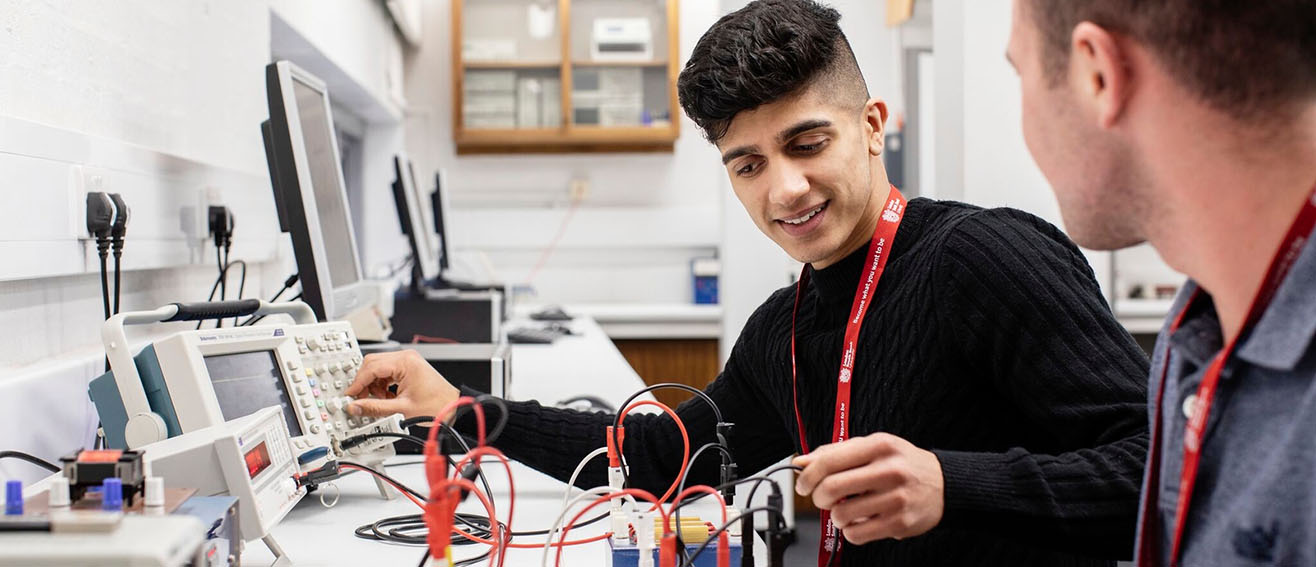
Facilities
Students experience design, testing and measuring – and producing their own productsThe practical approach we adopt means our students gain the essential knowledge and skills required to meet future demands for products and services in areas such as analogue and digital electronics, energy converters and drives, wireless communications, control systems, computer networks, electrical machines and power electronics.
Laboratories
- Control and Robotics
- Used for demonstrating and working on open and closed loop control systems in mechanical, chemical and electrical systems. We use computer-based methods and practical demonstrations. Robotics is one of the major practical applications of control engineering, and this is supported by a laboratory for students and separate research areas.
- Hardware and Software Interfacing
- Used for Computer Aided Engineering (CAE) using Multi-Sim or other virtual environment circuit design software packages, and for hardware/software interfacing between electronic circuits and software.
- Analogue and Digital Electronics
- Used for practical experimentation with analogue and digital circuits, and some electrical materials experiments. Supports CAE using Multi-Sim.
- Telecommunications and Networking
- Supports data transfer electronics including Radio Frequency (RF) technology and communication networks. Here students explore telecommunications and networking techniques, and can experiment with fibre optics for data transmission and with microwave energy technology. This lab has benefitted from recent investments in industry-standard (Cisco) communication and networking technology.
- Engineering Stores
- Our engineering stores contain a range of specialist engineering tools and test equipment, as well as soft modelling material, wood and metal.
- Electronics Project Room
- This is a controlled study space for students engaged in electronics projects - not only students of electronic engineering, but also other engineering students for whom electronics is a key constituent of their work. This facility includes workspace plus advice and support, reference material, specialist tools and test equipment and limited (funded) spares.
Software packages and training
- LabVIEW
- LabVIEW is a graphical programming platform that helps engineers scale from design to test and from small to large systems. It is a development environment for problem solving, accelerated productivity, and continual innovation.
- MATLAB
- MATLAB® is a high-level language and interactive environment for numerical computation, visualization, and programming. You can use MATLAB for a range of applications, including signal processing and communications, control systems, test and measurement. More than a million engineers and scientists in industry and academia use MATLAB, the language of technical computing.
- CISCO certification
- Cisco Career Certifications are IT Professional certifications for Cisco Systems products. The five levels of certification are: Entry, Associate, Professional, Expert, and Architect along with targeted certifications for Specialist and Technician. These are available in different subject tacks: Routing & Switching, Design, Security, Service Provider, Service Provider Operations, Data Center, Voice, Wireless and Video.
- C++ programming
- C++ is one of the most popular programming languages and is implemented on a wide variety of hardware and operating system platforms.
- Microsoft training courses
- LSBU is an authorised provider of Microsoft training courses, which offers our students the opportunity to enhance their employment prospects by attending courses on the Microsoft Certified Systems Engineer certification route. These courses are offered at heavily discounted rates to our enrolled students.
Accessing our facilities
Facilities, students and staff feature regularly in our knowledge transfer and consultation activities with industry. Read more about how we work with business at LSBU. You may also be interested to find out more about facilities and venue hire at LSBU.